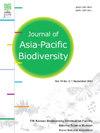与假金合欢有关的另一种线翅锯蝇的发现(膜翅目,蜂虻科)
IF 0.6
Q4 BIODIVERSITY CONSERVATION
引用次数: 0
摘要
Euura tibialis(Newman,1837)是在韩国新记录的,它攻击假金合欢树(Robinia pseudoacia L.)而不诱发胆汁。该物种原产于北美洲,但被引入欧洲和日本,被认为是一种入侵性的外来锯蝇。在这项研究中,我们介绍了这种新害虫在韩国的分类信息、简要的生物学注释以及遗传数据。本文章由计算机程序翻译,如有差异,请以英文原文为准。
Discovery of an additional nematine sawfly, Euura tibialis (Newman) (Hymenoptera, Tenthredinidae) associated with false acacia in Korea
Euura tibialis (Newman, 1837) is newly recorded in South Korea, attacking false acacia trees (Robinia pseudoacacia L.) without gall-inducing. This species is native to North America but introduced into Europe and Japan, and is regarded as an invasive alien sawfly. In this study, we present the taxonomic information and brief biological notes of this new insect pest in South Korea as well as genetic data.
求助全文
通过发布文献求助,成功后即可免费获取论文全文。
去求助
来源期刊

Journal of Asia-Pacific Biodiversity
Agricultural and Biological Sciences-Insect Science
CiteScore
1.70
自引率
12.50%
发文量
94
审稿时长
27 days
期刊介绍:
The Journal of Asia-Pacific Biodiversity (previous title was Journal of Korean Nature) is an official journal of National Science Museum of Korea (NSMK) and Korea National Arboretum (KNA). The scope of journal is wide and multidisciplinary that publishes original research papers, review articles, as well as conceptual, technical and methodological papers on all aspects of biological diversity-its description, analysis and conservation, and its application by humankind. This wide and multidisciplinary journal aims to provide both scientists and practitioners in conservation theory, policy and management with comprehensive and applicable information. However, papers should not be submitted that deal with microorganisms, except in invited paper. Articles that are focused on the social and economical aspects of biodiversity will be normally not accepted.
 求助内容:
求助内容: 应助结果提醒方式:
应助结果提醒方式:


